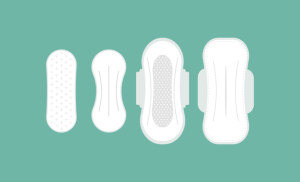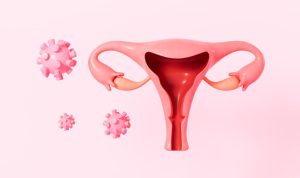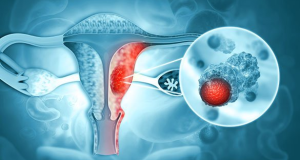Are you feeling queasy or nauseous before or during your period?
Do not worry, you’re not alone! Many women experience nausea before and during their menstrual cycle, and it can be a difficult symptom to deal with.
So, if you’re wondering what causes this feeling of nausea and how you can manage it, this blog post will provide some helpful information.
We’ll explore the potential causes of nausea before and during your period and discuss ways to cope with this symptom.

Is Nausea Before the Period Normal?
Yes! It is totally a normal and common thing. However, many factors might induce nausea before a period, including cramping, premenstrual syndrome (PMS), and pregnancy. If your symptoms are severe, you may have an underlying problem like endometriosis.
PMS is the most common cause of nausea before or during period. PMS affects 20 to 50 percent of women 7 to 10 days before their menstrual cycles.
What Is PMS?
During the second part of your menstrual cycle, you may experience a variety of symptoms. This time following ovulation and before bleeding begins might cause headaches, tiredness, and nausea.
These symptoms are associated with premenstrual syndrome (PMS). Experts estimate that 90 percent of menstrual women have at least one or more PMS symptoms.
You may feel nauseous when your body undergoes hormonal changes before your menstruation. In addition to the regular cramps and headaches, you may feel sick to your stomach and overall uncomfortable, being unable to go to the grocery store and stock up on the most comfortable sanitary pads.
Your cycle also activates a collection of molecules in your body known as prostaglandins, which can cause everything from headaches to nausea, as well as diarrhea.
Continue reading to learn about the causes and remedies of nausea before a period, and embrace womanhood to the fullest!
-
Hormonal Changes
It is well-known that hormones play a major role in women’s bodies, and this is particularly true before periods. Indeed, changes in hormone levels can cause nausea. Your body releases hormones throughout the month, and these can affect your digestive system, mood, and energy levels too.
For example: If you have been experiencing PMS symptoms for a few weeks or more before your period, then it’s likely that hormonal changes are causing them.
As estrogen and progesterone levels fluctuate, they can have an effect on the digestive system, leading to feelings of nausea and even vomiting. These hormones can also impact the body’s ability to absorb and process nutrients, which can lead to further digestive issues.
Additionally, when hormone levels change dramatically, they can cause fluctuations in blood sugar levels, leading to nausea. By understanding the connection between hormones and nausea before periods, women can take steps to manage their symptoms.
-
Dehydration
Nausea before your period can also be caused by dehydration. Many women experience an increased loss of fluids due to heavier menstrual flow, which can lead to dehydration. When the body does not have enough fluids, it can cause nausea, lightheadedness, and general feelings of uneasiness.
To prevent this from happening, it is important to stay hydrated and make sure you are drinking enough water each day. You may even want to increase your water intake before your period starts to ensure that you are getting enough fluids.
Additionally, avoiding caffeinated drinks such as soda or coffee can also help, as caffeine can cause dehydration.
-
Poor/ Unhealthy Diet
When it comes to the symptoms of premenstrual syndrome, poor diet choices can be a major factor. Eating large amounts of unhealthy processed foods and foods high in sugar, salt and fat can contribute to feeling nauseous before your period.
This is because such diets can lead to increased inflammation in the body, which can cause discomfort and other unwanted symptoms.
Eating small meals frequently throughout the day can help reduce nausea. Similarly, eating healthy meals that are rich in fiber, whole grains, and lean proteins can also provide relief.
Moreover, staying hydrated by drinking plenty of water is also important in order to keep your body functioning properly and avoid dehydration which can contribute to feeling sick. Additionally, supplementing with probiotics has been found to be helpful in reducing the severity of premenstrual symptoms.
All in all, making better dietary choices during the week leading up to your period can help reduce nausea and make you feel better overall.
To feel even more comfortable during your periods, choose embrace sanitary pads and stay stress free!
-
Due to Infection/ Illness
Illness or infection, particularly if it is severe, can be followed by vomiting or extreme stomach pain. Menstruation is not the cause of all symptoms that occur during a period. Food poisoning, stomach illnesses, food allergies, and a variety of other health conditions can all induce nausea during your period.
That’s why people who experience nausea before their period may be suffering from an unrelated sickness.
If this is the case with you, try using odor-free sanitary pads such as embrace womanhood pads so that you may be able to feel more comfortable for longer hours.
How Can You Get Rid of Nausea?
Are you feeling the unpleasant symptoms of premenstrual syndrome, such as nausea? There are a few potential ways to bring yourself some relief.
Here you go:
- Consider going outside for some fresh air or simply set up a fan and sit in front of it
- You could also engage in physical activity for 30 minutes, like walking or light/moderate exercise
- It is important to drink plenty of water and have small meals throughout the day
- Stick with foods like bananas, rice, toast, tea, and applesauce to help keep your blood sugar stable
Other alternatives:
You can try the following teas in case you’re a big fan of tea:
- Ginger Tea
- Chamomile Tea
- Peppermint Tea
These can help you reduce nausea and also boost your mood!

When Should You Seek a Doctor?
The menstrual cycle can be an uneasy experience for many women. In addition to the emotional and physical changes that come with it, there are certain symptoms that signal the need to see a doctor.
If you have never experienced nausea before your period, if you have a fever or feel severe pain, or if you throw up to the extent where you feel dehydrated or lose weight, then it is necessary to consult with a physician as soon as possible.
All in all, though PMS nausea can be difficult to manage, it is often nothing of concern. Fortunately, there are several helpful remedies for reducing its impact as mentioned above.
If the discomfort is severe or seems abnormal in any way, seek medical assistance as soon as possible. At the end of the day, only you are able to determine what is ordinary for your body and what isn’t!







